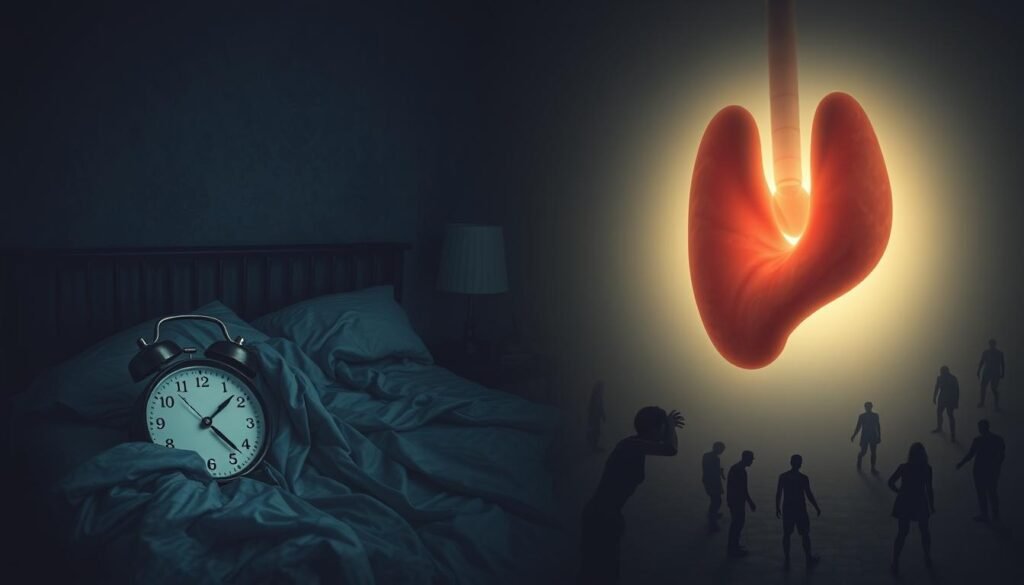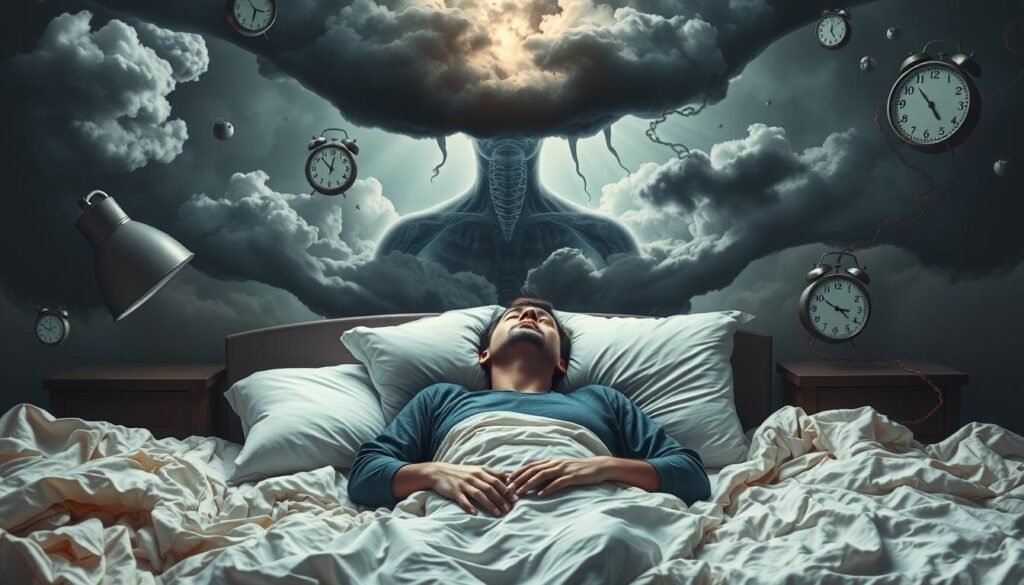Did you know that about 66.4% of people with Graves’ disease find it hard to fall asleep? This fact highlights the important link between how our thyroid works and our sleep health. Insomnia means you have chronic trouble falling or staying asleep. It can often be due to problems with the thyroid gland, especially hypothyroidism.
With hypothyroidism, the thyroid doesn’t work well, so the body can’t make the hormones it needs for regulating metabolism and sleep. This can lead to sleep issues. The connection between insomnia and hypothyroidism is strong. Learning how thyroid problems affect sleep is key to feeling better overall.
By understanding more about thyroid health and its effect on how we sleep, people can start to take steps for better sleep. They’ll also understand their body’s needs more clearly.
Key Takeaways
- 66.4% of people with Graves’ disease experience sleep difficulties.
- Hypothyroidism can lead to poor sleep quality and prolonged sleep latency.
- Insomnia may exacerbate daytime fatigue and myalgia associated with thyroid dysfunction.
- Thyroid conditions can complicate existing sleep disorders like restless legs syndrome.
- Treatments for hypothyroidism can significantly improve sleep disturbances.
Understanding Hypothyroidism and Its Symptoms
Hypothyroidism is a common illness where your body doesn’t make enough thyroid hormones. These hormones are crucial because they help your body use energy, stay warm, and keep your heart, brain, muscles, and other organs working as they should. Because of this shortage, people can experience things like feeling tired all the time, gaining weight, not being able to tolerate cold, and feeling down.
About 5% of folks in the U.S. are dealing with hypothyroidism. Surprisingly, 30% of them also suffer from sleep apnea. This shows a close link between thyroid health and how well you sleep. Many adults find it hard to get the recommended seven hours of sleep each night. Poor habits, like eating too much or drinking alcohol before bed, can make this worse. This is particularly true for women.
Sometimes, taking too much thyroid medication can cause trouble sleeping. This could be because the medication makes you feel anxious or more hungry than usual. Understanding the link between your thyroid and sleep is vital. Managing your thyroid well can help you sleep better. If you want to learn more about thyroid issues and sleep problems, check out this link.
The Role of the Thyroid Gland in Sleep
The thyroid gland is key for sleep regulation. It makes hormones like thyroxine (T4) and triiodothyronine (T3). These control your metabolism, energy levels, and sleep quality. When your thyroid works well, it helps your sleep cycle.
People with hypothyroidism may have a hard time sleeping. Their sleep-wake cycles get messed up, leading to sleep issues like insomnia. They might also get obstructive sleep apnea, making their sleep poor.
To sleep well, understanding how your thyroid affects sleep is crucial. Keeping your hormones balanced is important. For tips on better sleep, check strategies to improve sleep hygiene.
Is Insomnia a Symptom of Hypothyroidism
Insomnia is tough for those with thyroid problems. Studies link insomnia to hypothyroidism, leading to sleep issues. Folks with hypothyroidism struggle to sleep well, affecting their sleep quality.
Exploring the Link Between Hypothyroidism and Sleep Disorders
Research finds low thyroid hormone levels raise the risk of sleep apnea. It’s 1.88 times more likely for them than people with normal levels. Hypothyroidism can mess with sleep, hurting its quality and length. Those with mild thyroid issues also face sleep troubles, like poor sleep quality and longer time to fall asleep. These facts show that thyroid hormone management is key in tackling insomnia and thyroid problems.
Factors Contributing to Sleep Issues in Hypothyroidism
Many things cause insomnia in those with hypothyroidism. Joint pain and tiredness make sleeping hard. Stress and anxiety can make insomnia worse, worsening sleep health. It’s vital to understand these issues for better treatment plans. Managing insomnia and hypothyroidism together can improve health. Experts discuss ways to handle both here.

The Impact of Thyroid Hormones on Sleep Quality
Thyroid hormones are very important for our health, especially for how well we sleep. A balanced level of these hormones keeps our metabolism and energy in check. If these hormones are off, we may face sleep issues like insomnia or sleeping too much, which affects how we function daily.
A study with medical students in Tehran showed a link between thyroid problems and poor sleep. Students with bad sleep had higher levels of thyroid hormones. This suggests that hormone imbalances can lower sleep quality and raise stress. High stress can make thyroid problems worse, leading to more sleep issues.
Living a healthy lifestyle is key to managing sleep when dealing with thyroid issues. Eating right helps our metabolism and energy, reducing tiredness during the day. Exercising improves sleep and lowers stress and anxiety. Deep breathing before bed can calm the mind, helping with sleepless nights caused by stress.

Making your sleeping area calming can also improve sleep. A cool room, dark curtains, and a warm bath before bed can all help. If you notice new or odd symptoms, talking to a doctor quickly is important. Knowing how thyroid hormones affect sleep can help us find ways to sleep better, even with hormonal imbalances.
For more details on how sleep and hormones are connected, you can check out these studies.
Common Symptoms Associated with Hypothyroidism
Many people with hypothyroidism face several symptoms. These symptoms make their daily life hard. They feel more than just tiredness, with their sleep and daily tasks affected too.
Physical Discomfort and Its Effect on Sleep
For those with hypothyroidism, physical discomfort greatly affects sleep. Joint pain, muscle aches, and not handling cold well make sleeping hard. Recognizing and treating these symptoms can enhance sleep quality.
Poor sleep often links to the discomfort these patients feel. This shows how closely related physical pain and sleep problems are.
Daytime Fatigue and Hypersomnia
People with hypothyroidism often feel very tired during the day and have hypersomnia. This sleepiness makes insomnia worse, leading to more tiredness. Addressing these symptoms is key to feeling alert during the day.
Making changes in lifestyle, like better sleep habits, helps break this cycle. To understand more, check out how insomnia affects health here: chronic insomnia’s impact on your physical.

How Insomnia Intersects with Other Sleep Disorders
Insomnia often goes hand in hand with other sleep issues like obstructive sleep apnea (OSA) and restless legs syndrome (RLS). It’s important to understand these links for good care. Each condition can make insomnia worse, complicating the situation for sufferers.
Obstructive sleep apnea means breathing stops and starts during sleep. This leads to disrupted sleep and feeling tired during the day. Such disruptions make insomnia worse, creating a hard-to-break cycle. Plus, fluctuating sleep quality can increase insomnia symptoms.
Restless legs syndrome causes a strong need to move the legs, usually at night. It makes falling or staying asleep hard, adding to insomnia. The discomfort from RLS can prevent a good night’s rest, hurting overall health.
Figuring out how insomnia links with these disorders needs a detailed look. A team approach, including sleep experts, might help. Treating the root causes of OSA or RLS might improve insomnia symptoms.
| Sleep Disorder | Characteristics | Impact on Insomnia |
|---|---|---|
| Insomnia | Difficulty falling or staying asleep | May lead to daytime fatigue and impaired function |
| Obstructive Sleep Apnea | Repeated breathing interruptions during sleep | Can cause fragmented sleep and increased insomnia symptoms |
| Restless Legs Syndrome | Urgent urge to move legs, especially at night | Worsens ability to fall asleep, exacerbating insomnia |
To address these interlinked sleep disorders, a deep understanding of their impact on sleep is needed. Proper care can help people relieve insomnia and better their sleep overall.
Identifying Hypothyroidism: Testing and Diagnosis
Diagnosing hypothyroidism is crucial for tackling symptoms like insomnia. It starts with thyroid testing. These tests check thyroid-stimulating hormone (TSH levels) and free thyroxine (T4). Knowing these hormone levels is key to assessing thyroid health.
In the U.S., 0.3% to 3.7% of people have overt hypothyroidism. Women, especially those over 50, are more likely to get this condition. Subclinical hypothyroidism has mild TSH level increases, from 4.5 to 10 mU/L. It’s a hot topic among healthcare providers. About 5% to 10% of women over 50 have it. Meanwhile, 2% of women between 70 and 80 have overt hypothyroidism.
“Early diagnosis and intervention can prevent a decline in related symptoms, including sleep disturbances.”
Both genes and the environment play a role in Hashimoto thyroiditis, the most common hypothyroidism type, needing lifelong treatment. Riedel thyroiditis, a rare condition, turns the thyroid into scar tissue, leading to hypothyroidism. A large study with over 5,000 people showed many had symptoms like brain fog. This shows diagnosing hypothyroidism and its effect on thinking is complex.
| Demographics & Statistics | Details |
|---|---|
| Prevalence in General Population | 0.3% to 3.7% |
| Higher Risk Group | Women, especially over 50 years |
| Subclinical Hypothyroidism Occurrence | 5% to 10% of women over age 50 |
| Overt Hypothyroidism in Women (70-80 years) | 2% |
| Average Age of Study Participants | Around 50 years |
| Percentage with Hashimoto’s | About 50% |
| Symptoms Reported | Fatigue, forgetfulness, sleepiness, difficulty focusing |
Knowing key details about hypothyroidism helps in its early hypothyroidism diagnosis. This makes managing the condition and symptoms like insomnia easier.
Managing Insomnia Linked to Hypothyroidism
Insomnia can really affect those with hypothyroidism. It’s key to tackle thyroid problems to sleep better. The imbalance of hormones from hypothyroidism can make insomnia worse. This means it’s vital to find treatments that work for you.
Treatment Options for Hypothyroidism
Hypothyroidism treatment often uses hormone therapy. Medicines like levothyroxine are common for thyroid hormone replacement. About 95% of hypothyroidism cases are due to thyroid gland issues. Fixing these can help with thyroid symptoms and sleep.
Symptoms usually start to get better after two weeks of treatment. But it might take several months for a full recovery in severe cases. It’s important to have regular blood tests. This helps fine-tune the medication based on life changes or as you get older.
Homeopathic Treatment for Insomnia
For a different approach, homeopathic treatment for insomnia linked to hypothyroidism includes natural sleep remedies. These might be herbal supplements and lifestyle changes to improve sleep. Homeopathic sleep aids are a softer option, avoiding dependence on drugs. Always talk to a healthcare professional before trying new remedies to make sure they’re safe and right for you.
Knowing how thyroid health and sleep connect is powerful. It helps you get the right healthcare guidance. Talking openly with doctors about sleep issues is critical. If you don’t, insomnia could cause more health problems.
Conclusion
The link between insomnia and hypothyroidism is getting more attention. It shows how important thyroid function is to sleep health. People with thyroid problems often have trouble sleeping. Insomnia is a common issue for them. By treating thyroid issues with medicine and lifestyle changes, sleep and overall health can improve.
About 30% of people with hypothyroidism may have sleep apnea too. This shows how complex these problems are. Even when thyroid levels are normal, some still have sleep problems. This could mean other issues like sleep apnea are present. A full approach to care that looks at both thyroid and sleep issues is needed. Ongoing research is vital to find better treatments and help patients more.
Managing insomnia and hypothyroidism well means understanding how they affect each other. With many people affected by hypothyroidism, good sleep is key to treatment. Consulting with healthcare experts can help improve sleep and thyroid health.